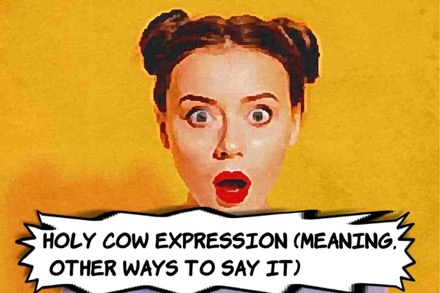The English language is full of colorful idiomatic expressions that enrich our conversations and add a touch of flair to our daily interactions. One such expression that often catches our attention is ‘holy cow.’
This article aims to delve into the meaning and significance of the holy cow expression, while also exploring alternative ways to convey similar sentiments.
Whether you’re curious about its origin or seeking alternative phrases to spice up your language, this article will provide insights into the fascinating world of the holy cow expression.
What Is The Meaning Of ‘Holy Cow’
The phrase ‘holy cow’ is an exclamation used to convey a sense of astonishment, surprise, or disbelief. It is an idiomatic expression that is often employed when something extraordinary or unexpected occurs, catching people off guard.
The exact origin of the expression is unclear, but it is believed to have emerged in the United States during the early 20th century.
Some theories suggest that it may have derived from the sacred status of cows in Hinduism, where they are considered symbols of purity and fertility.
By invoking the phrase ‘holy cow,’ individuals express their amazement or awe in a playful and lighthearted manner.

When used in conversation, ‘holy cow’ serves as an enthusiastic exclamation to emphasize surprise or shock. For example, if someone witnesses a remarkable feat or an astonishing event, they might exclaim, ‘Holy cow, I can’t believe my eyes!’ The phrase adds emphasis and highlights the speaker’s astonishment in a non-offensive and often humorous way.
‘Holy cow’ has become ingrained in the English language as a colloquial expression, offering a vibrant and expressive way to react to surprising situations.
While its precise origins may remain uncertain, its popularity and widespread usage have solidified its place in contemporary idiomatic expressions.
Is It Okay To Say ‘Holy Cow?’
Yes, it is generally acceptable to say ‘holy cow’ in informal or casual settings. It is a lighthearted and playful expression used to convey surprise or astonishment.
The acceptability of saying ‘holy cow’ depends on various factors, including the context and the individuals involved in the conversation.
In informal or casual settings, such as among friends, family, or colleagues who share a common understanding and rapport, using the phrase ‘holy cow’ is generally acceptable.
It is often perceived as a lighthearted and playful expression used to convey surprise or astonishment.
However, it is important to be mindful of the cultural and religious sensitivities of those around you. Some individuals or cultural backgrounds may find religious references in expressions like ‘holy cow’ inappropriate or offensive.
This is particularly relevant when interacting with people from diverse backgrounds or in more formal or professional settings where maintaining a respectful and inclusive atmosphere is crucial.

To ensure effective communication and avoid unintentionally causing offense, it is advisable to consider alternative expressions that convey similar sentiments without the potential for cultural or religious misunderstandings.
For example, you can opt for phrases like ‘wow,’ ‘oh my goodness,’ or ‘unbelievable.’ These alternatives maintain the tone of surprise or astonishment while avoiding specific religious references.
By being sensitive to the preferences and perspectives of others, you can create a more inclusive and respectful environment for communication.
It’s always a good practice to gauge the appropriateness of certain phrases based on the people and context in which you are using them.
Adapting your language accordingly can help foster positive interactions and minimize the risk of causing unintentional offense or discomfort.
Do People Still Say ‘Holy Cow?’
Yes, people still use the phrase ‘holy cow’ in their everyday conversations. While language and expressions continuously evolve over time, ‘holy cow’ has retained its popularity and usage.
It remains a recognizable and commonly employed idiom to express surprise or astonishment in a playful and light-hearted manner.

Although the frequency of its use may vary among different regions, social groups, or generations, ‘holy cow’ continues to be part of the English lexicon. It is a versatile expression that can be found in informal conversations, casual interactions, and even in various forms of media, such as books, movies, and television shows.
While some individuals may prefer alternative expressions or newer idiomatic phrases, ‘holy cow’ still resonates with many people and maintains its place in the popular vernacular.
Language is dynamic, and certain expressions may wax and wane in popularity over time, but as of now, ‘holy cow’ remains in use as a way to convey surprise or astonishment.
10 Other ways to say ‘Holy cow?
Here are ten alternative expressions to ‘Holy cow’ along with extensive explanations for each:
‘Oh My Goodness/Gracious/Gosh’

These phrases are milder alternatives to ‘Holy cow’ and are commonly used to convey surprise or astonishment in a more restrained manner.
They are versatile expressions that can be used in various contexts. ‘Oh my goodness’ and ‘oh my gracious’ carry a sense of politeness and can be used when one wants to express astonishment in a more formal or respectful way.
‘Oh my gosh’ is a casual alternative that is often used in informal conversations and has a similar effect of expressing surprise or disbelief.
‘Wow’
This simple and versatile exclamation is a popular alternative to ‘Holy cow.’ It conveys amazement or astonishment and can be used in a wide range of situations.
‘Wow’ is a short and impactful expression that effectively communicates the speaker’s surprise or wonder.
‘Oh, my God’
This phrase carries a similar tone of astonishment as ‘Holy cow,’ but it contains a religious reference.
It is important to be aware of different cultural and religious sensitivities when using this expression, as it may be considered inappropriate or offensive to some individuals.
However, in casual conversations where religious references are not a concern, ‘Oh, my God’ can be used to express astonishment or shock.
‘Unbelievable/Amazing/Incredible’

These adjectives can be used to express astonishment without resorting to an exclamation. They emphasize the surprising nature of a situation or event.
For example, if someone hears some astounding news, they might exclaim, ‘That’s unbelievable!’ or ‘That’s amazing!’ or ‘That’s incredible!’
These alternatives effectively convey a sense of astonishment and can be tailored to fit the specific situation.
‘No Way’
This colloquial expression is commonly used to express disbelief or surprise. It indicates that the speaker finds something hard to believe or comprehend.
It can be used as an alternative to ‘Holy cow’ when reacting to unexpected information or events. For example, if someone shares an astonishing fact, you might respond with ‘No way! That’s incredible!’
‘Good Heavens’
This expression is slightly more formal and old-fashioned, conveying surprise or astonishment. It is often used in a more refined or sophisticated manner.
The phrase ‘Good heavens!’ carries a touch of elegance and adds a touch of class to the reaction.
‘Oh, My Stars’

This whimsical expression is used to convey surprise or astonishment in a playful and imaginative way.
It brings a sense of wonder to the reaction and can be a creative alternative to ‘Holy cow.’ ‘Oh, my stars!’ adds a touch of charm and adds a whimsical tone to the expression of surprise.
‘Holy Moly’
This lighthearted and playful alternative to ‘Holy cow’ carries a similar meaning and is often used to express surprise or astonishment in a more light-hearted manner.
It conveys a sense of amazement or disbelief but with a touch of humor. ‘Holy moly!’ can be used in informal conversations to express astonishment or to add a playful flair to the reaction.
‘You’re Kidding Me’
This phrase conveys disbelief or astonishment, indicating that something is hard to believe or comprehend. It can be used as an alternative to ‘Holy cow’ when reacting to surprising information.
For example, if someone tells you something astonishing, you might respond with ‘You’re kidding me! I can’t believe it!’
‘Well, I’ll Be Darned’

This expression conveys astonishment or surprise, suggesting that the speaker is taken aback or amazed by something unexpected.
It can be used as a substitute for ‘Holy cow’ when expressing astonishment. ‘Well, I’ll be darned’ carries a sense of disbelief and indicates that the speaker is genuinely surprised or amazed by the situation.
It can be used in a variety of contexts, from casual conversations to more formal settings, to convey astonishment or shock.
Wrap Up
As language continues to evolve, it’s essential to be aware of current expressions and cultural sensitivities surrounding idiomatic phrases.
Being flexible in your choice of expressions allows you to adapt to different settings and ensure that your communication is respectful and inclusive.
There are various alternatives to the phrase ‘Holy cow’ that can be used to convey surprise or astonishment.
From milder expressions like ‘Oh my goodness’ to more emphatic options such as ‘Wow’ or ‘Oh, my God,’ each alternative brings its own unique tone and connotation.
The choice of alternative expression depends on factors such as the formality of the situation, cultural sensitivities, and personal preference.
By having a range of alternatives at your disposal, you can effectively communicate your astonishment while remaining mindful of the context and the individuals involved in the conversation.
Whether you opt for playful alternatives like ‘Holy moly’ or choose more restrained expressions like ‘Unbelievable,’ the goal is to convey your surprise or amazement in a way that resonates with others and fosters effective communication.
Ultimately, the alternatives to ‘Holy cow’ presented here provide you with a diverse set of expressions to choose from, allowing you to convey surprise or astonishment in a manner that suits the situation and the people you are interacting with.
By using these alternatives effectively, you can add depth and variety to your language while maintaining effective and respectful communication.

